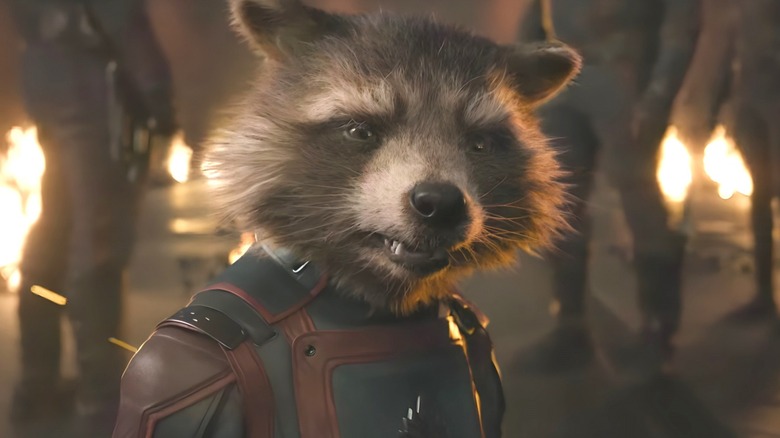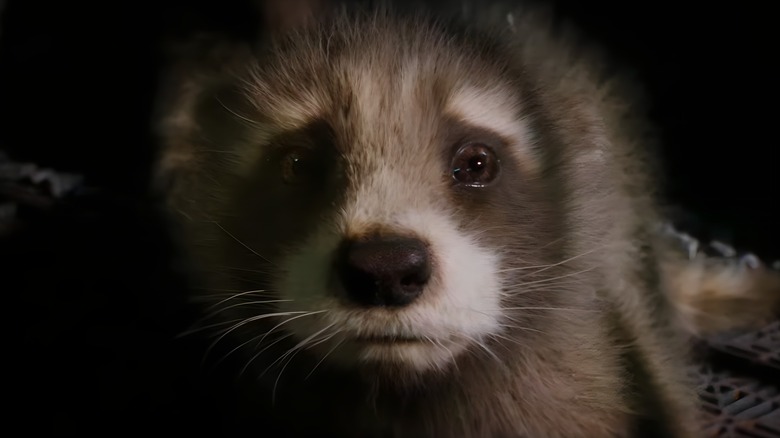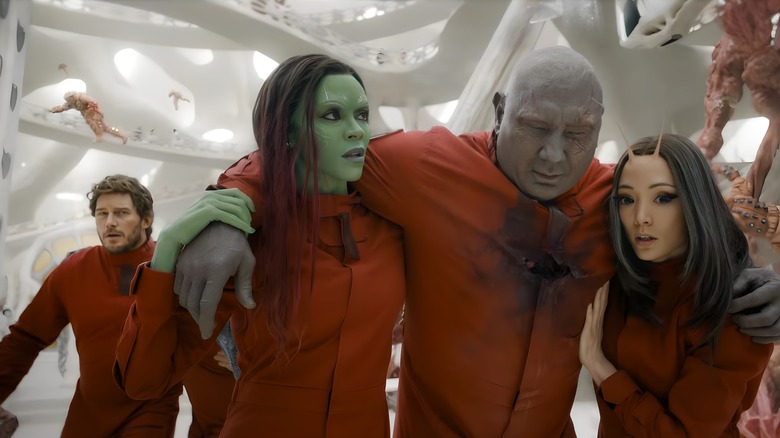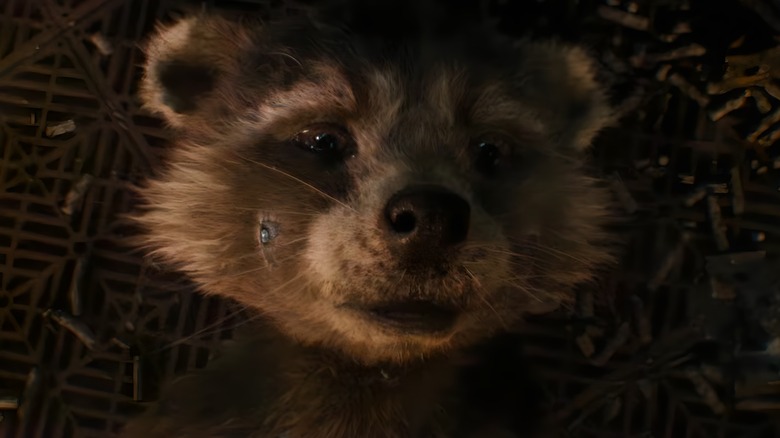GOTG Vol 3's Mid-Credits Scene Contradicts The Movie's Themes
Not all post-credits scenes are created equal — but the stinger for "Guardians of the Galaxy Vol. 3" is downright indefensible.
Since the first "Iron Man" in 2008, it has become tradition (much to the chagrin of theater employees everywhere) for fans to stay in their seats until the very last name has rolled by in the credits of a Marvel Cinematic Universe film. They hope, arguably with some misplaced optimism, for a scene so revelatory about the future of the franchise that it rivals — or possibly supersedes — even the most impactful epiphanies had in the hours leading up to it.
In some cases, they get just that — for its many, many faults, "Ant-Man and the Wasp: Quantumania" did provide a haunting look at the ever-growing threat to the multiverse. Most of the time, however, scenes fall short of this goal. More often than not, these clips tend to be obligatory epilogues ("Thor: The Dark World," "Black Panther"), genuinely funny trolls ("Spider-Man: Homecoming," "Iron Man 3"), or scenes with content so esoteric as to be perplexing to a majority of the audience ("Doctor Strange in the Multiverse of Madness").
As disappointing as a majority of the offerings may be, it can at least be said that they never actively undermine the rest of the film — at least, until now. In one of its final moments, "Guardians of the Galaxy Vol. 3" not only guts any thematic coherence it once tenuously hung onto, but confirms the self-satisfied vagueness that ruins an otherwise solid story.
Rocket Raccoon saves ship full of animals... only to slaughter a horde of them
The scene in question sees Rocket Raccoon (Bradley Cooper) now leading a new team of Guardians in an assault against a stampede of animals heading toward a desert community. Phyla (one of the new members rescued by the former team from the High Evolutionary) curiously asks him if he feels bad for the animals — Rocket merely shrugs her off with a rote platitude about protecting others, which clumsily masquerades as the story's theme.
The glaring issue with writer-director James Gunn using this moment to punctuate his entire plot is that he spent nearly three hours ostensibly communicating that all life matters through excruciating sequences of animal cruelty. It would be as if James Cameron reversed course at the end of "Avatar: The Way of Water" and suddenly had the Sullys hunting the whale-like Tulkun for food as Sam Worthington growls about "doing anything to protect his family." If those constant, painful scenes — from which the entire emotional narrative is concocted — weren't meant to create the exact empathy that would render this mid-credits sequence horrific to the audience, one can't help but wonder what the point of this miserable exercise ever was.
It doesn't seem as though Gunn is intentionally trying to say "all life matters... until we start comparing species" (even though he, unfortunately, ultimately does), but rather this scene merely reveals how vague and empty the core ideas at play actually are — especially in comparison to previous entries.
This scene destroys everything great James Gunn did
Gunn is in the slightly unenviable position of being the most consistent superhero director working at the moment. Yes, it makes him a perfectly reliable artist to helm just about any comic book project in a fundamentally successful manner (we very much look forward to "Superman: Legacy"), but it also makes him his own toughest competitor. There's a sound argument to be made that "Vol. 3" is the best post-"Endgame" MCU entry, though it doesn't hold a candle to much of anything Gunn has previously created in this genre. At the very least, however, "Vol. 3" has an unimpeachable moral argument — everyone matters.
Broad as it reads, Gunn adheres to this truth throughout the main story, even on a meta-level. It would be expected in such an operatic finale to see the deaths of many beloved characters — Gunn very pointedly navigates the story without a single major death, with his core characters surviving because of the emotional connections they've built throughout the trilogy. When it could've easily earned points for "realism" or "consequence" by ritualistically killing its darlings, "Vol. 3" is unquestionably, refreshingly subversive when it comes to how it sends its players off.
And yet, this penultimate stinger that so efficiently undermines what theme the film could have had also distorts its biggest strength. The preservation of his ensemble no longer seems like a bold statement about family and perseverance but the unknowing declaration of some bizarre hierarchy. Human lives are actually all that matter, and animal lives are expendable as long as they serve human emotional catharsis and development.
This scene is indicative of a much larger problem
Here is where defenders angrily rush to their keyboards to explain how we're reading too deeply into a film that centers around a talking raccoon — and, to be completely honest, that irredeemably weak defense — which has carried a majority of the MCU's films as of late — only proves this point. With its post-credits scene, "Vol. 3" is not proving itself to be some secret eco-fascist manifesto to be deciphered only by Twitter's most annoying philosophers — on that, we can all hopefully agree.
No, it proves itself to be something much better: thoughtless. It proves itself to be a film actively repulsed by deeper engagement, a film that insults anyone with the audacity to care about what it might want to say. There's plenty of dumb fun to be had with "Guardians of the Galaxy Vol. 3" — as there was with "Quantumania" and "Thor: Love and Thunder." If this is what the new era of the MCU seeks to accomplish, one can only hope that they find and secure their target audience as quickly as possible. May they entertain and be entertained until the very last star burns out.
But this was once a universe of films that asked audiences to see these admittedly absurd worlds and find something human within them — this same talking raccoon once showed fans everywhere that no matter how aggressively you try to push them away, family will always be there for you if you let them. Fans growing up with today's MCU will hopefully fall as madly in love with their stories as older fans once did — even as that love fades with each new weightless entry.



